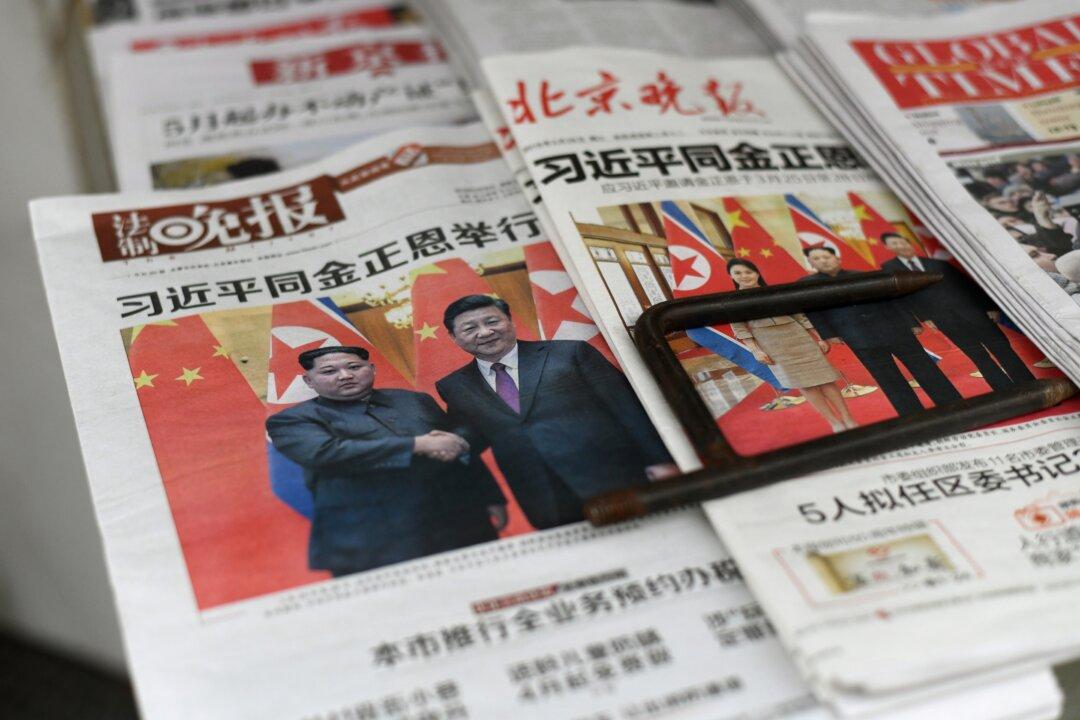News analysis
During North Korean leader Kim Jong Un’s visit to China in March, his first-ever overseas trip since taking power, Chinese President Xi Jinping made this telling remark about North Korea-China relations: “The traditional friendship between China and North Korea is a relationship between two parties and two countries that the older generation of leaders personally created and carefully fostered. This is both sides’ valuable wealth.” He added that in the future, this “family relative-like” relationship should “be passed on continuously, and developed even better.”
Owing to their shared communist DNA and history of fighting alongside each other in the Korean War, China and North Korea are strategic allies. The Chinese regime is also North Korea’s biggest trading partner and provides many of the key resources it needs to survive: oil and food supplies.
Former Chinese Communist Party leader Mao Zedong once characterized the relationship thusly: “If the lips are gone, the teeth will be cold.” North Korea acts as China’s buffer against the U.S.-backed South Korea and the U.S. key ally, Japan; thus, it is effectively a satellite nation of China’s communist regime.
But in recent years, observers believe there has been a cooling of relations between the two countries under Kim and Xi. A string of nuclear tests and brazen acts like the execution of Kim’s uncle proved embarrassing for Beijing. According to a 2017 analysis by the U.S. think tank Center for Strategic and International Studies, under Kim and Xi’s leadership, the two countries saw the fewest high-level diplomatic exchanges since Mao ruled China.
When the United Nations Security Council passed severe economic sanctions against North Korea late last year as penalties for its testing of intercontinental ballistic missiles, China seemed to mostly follow through, shutting down North Korean businesses in China and instructing banks to stop conducting business with North Korean customers. The busy border between the two countries became deserted for a while, though Chinese ships were continually spotted conducting illegal trade with North Korea.
But once U.S.-North Korea negotiations on denuclearization brokered by South Korea began in earnest and a President Donald Trump-Kim summit seemed on the horizon, China did not want to be left out. China decided to step up the optics and demonstrate its relevance by inviting Kim to Beijing twice within several weeks. Meanwhile, Kim got the assurance he needed from his biggest ally that it would ensure the stability of the North Korean regime, according to South Korean and Japanese media that revealed the contents of their conversations.
That is precisely China’s biggest stake in the game: to ensure that the communist regime in North Korea does not collapse. China does not want to lose North Korea as leverage against the United States’ influence in the Asia Pacific. Together, they form a bloc against the United States and its allies.
This attitude became clear in an editorial published by the Chinese state-run newspaper Global Times on June 4, which agitated for China’s participation in denuclearization talks after news emerged that a peace treaty formally ending the Korean War—which concluded in an armistice in 1953—could be signed at the Singapore summit.
“If China does not participate, and U.S.-North Korea or U.S.-North Korea-South Korea were to sign a declaration ending the war, it cannot technically replace the armistice,” the Global Times argued, since the 1953 armistice was also signed by the Chinese armed forces who participated in the Korean War. “It would only be a bilateral or trilateral document, and thus can be nullified at any moment.”
Some observers also believe China has another ulterior motive in wanting to get involved in nuclear talks. During Kim’s visit, Chinese state media asserted that Xi helped ensure Kim’s commitment to denuclearization. Trump thanked Xi for his assistance. This was perhaps an attempt to get on the U.S.’ good side and pave the way for better trade negotiations amid tensions with the United States: a good deed in exchange for some benefits.
But after Kim’s visits to Beijing, North Korea’s rhetoric did a 180 and became more aggressive. Kim threatened to call off the summit, leading Trump to cancel the summit in a publicized letter to Kim. Trump told reporters at the White House that Beijing may have influenced Kim after he visited.
And perhaps unsurprisingly, after Kim’s visits, the border became porous again. Busloads of North Korean laborers were transported into China, in violation of UN sanctions against issuing new labor permits to North Koreans. Chinese firms in bordering towns also stopped repatriating North Korean workers.





